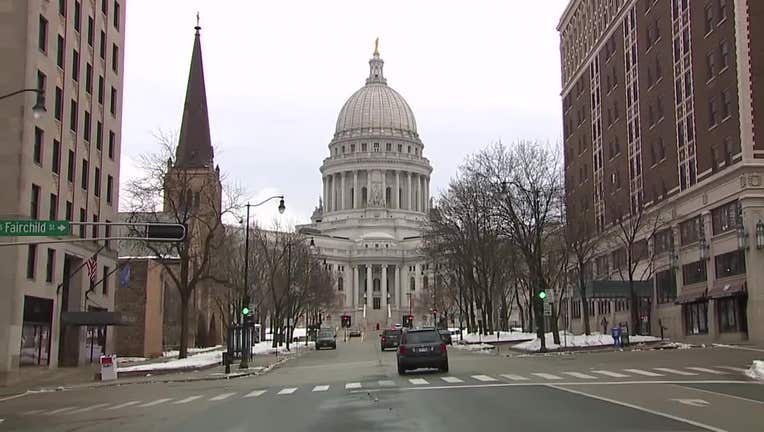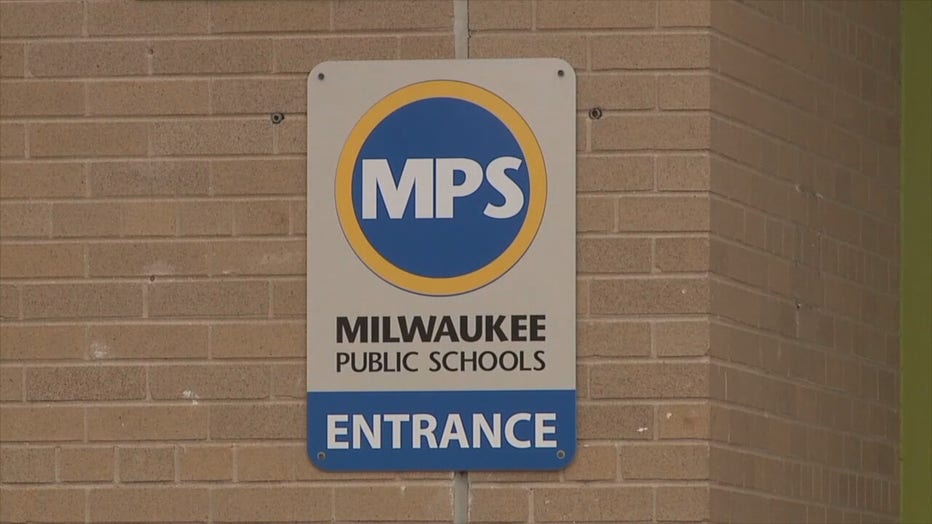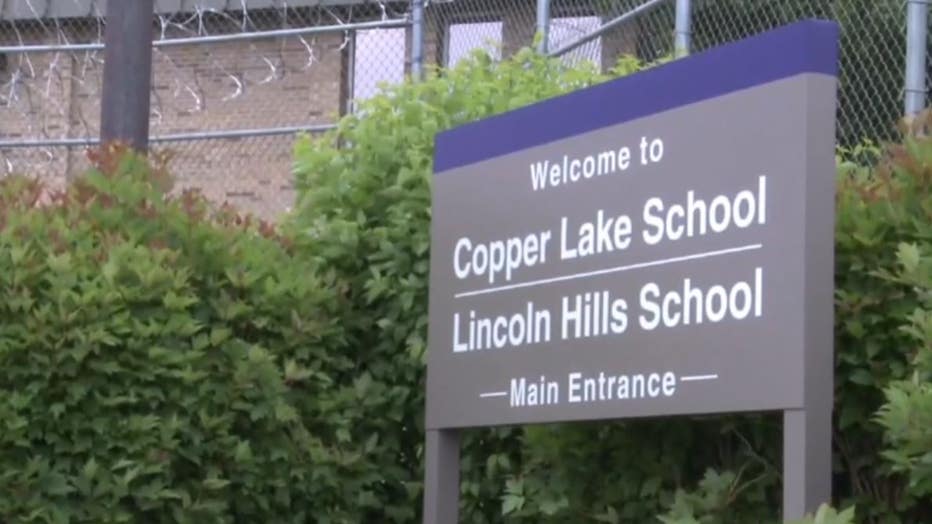Wisconsin Senate ends session; MPS breakup, youth prison voted on

Wisconsin Capitol in Madison
MADISON, Wis. - The state Senate wrapped up Wisconsin's two-year legislative session Tuesday night with votes on a proposal to create a new juvenile prison and Republican-backed efforts likely headed for vetoes that would break up the Milwaukee school district and expand the state's school voucher program.
The Assembly met for the final time last week. The Senate finished its work on 80 bills in a floor period that lasted more than six hours, freeing lawmakers to shift their focus to campaigning for the fall election.
The Milwaukee school district bill calls for dividing the district into four to eight smaller districts beginning in 2024. Republicans say the move would increase accountability and lead to better student performance. Opponents, including the state teachers union, argue there's no guarantees the plan would lead to improved student achievement.
SIGN UP TODAY: Get daily headlines, breaking news emails from FOX6 News
The Senate passed the measure 19-12 and sent it on to Evers, who almost certainly will veto it. He said Monday that the bill was "illogical" and no data shows it would help students.
Another bill up for final approval that's also almost certainly headed for an Evers veto would expand the state's voucher school program by eliminating income limits for applicants. The voucher program provides participants with state subsidies to cover tuition at private schools. Republicans insist the program gives struggling students options; opponents say the state can't afford to fund both public and private schools. The Senate approved the bill on a 20-11 vote on Tuesday evening. The Assembly passed the measure in February. It goes next to Evers.

Milwaukee Public Schools (MPS)
The Senate gave final approval to a bipartisan proposal that would authorize borrowing $42 million to build a new youth prison in Milwaukee County, the latest step in a years-long effort to close the troubled Lincoln Hills juvenile prison in northern Wisconsin.
The facility in Irma has been dogged by allegations of prisoner abuse, sexual assault, witness intimidation and record tampering. An FBI probe in 2015 ended with no charges filed but legal settlements with inmates' families has cost the state Department of Corrections more than $25 million.
The Legislature four years ago voted to close the prison, but lawmakers never came through with the money for a replacement facility.

Under the bill, Lincoln Hills would become a minimum security adult prison. The measure doesn't specify where in Milwaukee County the new youth prison would be located but mandates construction would be contingent upon the local government entity's approval.
The Assembly passed the bill unanimously last week. The Senate approved the bill on a voice vote and sent it on to Democratic Gov. Tony Evers, who has called the proposal "a step in the right direction."
FREE DOWNLOAD: Get breaking news alerts in the FOX6 News app for iOS or Android.
Other notable Republican-backed bills on the Senate agenda, all of which are likely to be vetoed, included:
- A plan to end legal immunity for University of Wisconsin officials who interfere with free speech rights on campus. The measure is designed to clear the way for conservative speakers on campus. The Senate approved the bill on a voice vote. The Assembly passed it last month. It goes next to Evers.
- Proposals to allow parents to opt their children out of school mask mandates, force schools to offer in-person instruction and end requirements that unvaccinated government workers submit to weekly COVID-19 tests. The Senate passed the school legislation on a 19-11 vote and the testing bill on a voice vote. The Assembly passed the measures earlier this year. They now go to Evers.
- A bill that would force UW System schools to use objective criteria for admissions. The measure would outlaw criteria based on race, national origin or religion. The bill's supporters say UW's current criteria is subjective and opaque, leaving the public no way to determine what standards an applicant must meet to be accepted. System officials say they don't test applicants on the basis of race, ethnicity or religion. The Senate passed the measure 18-13. The Assembly approved it in February. It now goes to the governor.
- A proposal that would allow people to carry concealed weapons in churches on private school grounds. Republicans say the bill would help churchgoers and security guards defend themselves from attack. Opponents, including the Wisconsin Catholic Conference, maintain the bill would lead only to a proliferation of guns, which undermines a message of peace. The Senate passed the bill on a voice vote. The Assembly approved it in January. The measure now goes to Evers.
- A proposal that would allow parents to opt their child out of a class or avoid instructional materials based on religious or personal convictions, give parents the right to be informed about any violence or crimes occurring at their child's school and give parents the right to choose the pronouns that refer to their children at school. Parents could sue schools that don't comply. Democrats say the bill will lead to banned books and lawsuits against school districts and takes control away from local school boards. The Senate passed the bill 19-11. The Assembly passed it in February. It goes next to Evers.
- A bill that would enshrine police's ability to use no-knock warrants in state law. The national debate over no-knock warrants, which allow police to storm residences without any warning, has been growing in recent years. Proponents maintain police need the element of surprise; opponents contend the lead to violent confrontations with residents. Just last month police killed Amir Locke of Minneapolis after they entered his apartment unannounced and he reached for a gun. The Senate passed the bill on a 20-12 vote with no debate. The Assembly passed the measure in January. It goes next to Evers.
The Senate also passed a constitutional amendment Tuesday on a 20-11 vote that would strip the governor of his ability to spend federal aid and hand that power to the Legislature.
Constitutional amendments must pass two consecutive legislative sessions and a statewide referendum. Senate approval Tuesday marked the first session the proposal has passed. The next two-year session begins in January.
Featured
Kenosha officer on leave, middle school fight
Cellphone video from inside a Kenosha middle school shows an off-duty police officer kneeling on a sixth-grader's neck as he broke up a fight. The images have gone viral and have led some parents to call for change.
Featured
Former Wisconsin Lieutenant Governor Margaret Farrow dies
Former Wisconsin Lieutenant Governor Margaret Farrow has died. That word comes from Farrow's son, Waukesha County Executive Paul Farrow in a news release on Tuesday, March 8.

Wisconsin budget surplus, Evers' refund proposal shot down
The Republican-led Senate shot down Gov. Tony Evers' $150 refund proposal Tuesday, ending a special session without debate or vote.
Official statements
State Sen. Chris Larson (D-Milwaukee)
"Wisconsin Republicans passed no fewer than 16 bills related to K-12 and higher education in today’s Senate floor session, including what can best be referred to as a Book Burner’s Bill of Rights. Not one of these bills do anything to improve learning outcomes for our children, and range from bits of needless bureaucracy to lab-generated mystery meats of public policy that, if enacted, would make administering K-12 education in our state next to impossible.
"Giving in to the demands of a vocal fringe who claim to represent parents with legislative proposals hatched in right-wing think tanks, Senate Republicans abdicated any claim as good stewards of our public schools. With the estimated $577 million increase in property taxes their voucher expansion bill would create, they’ve proven also to be poor stewards of public resources. Finally, these anti-education bills represent yet another attack by Wisconsin Republicans on the maxim of local control.
"Hours after refusing Governor Evers’ call to special session to fully fund our schools, support caregivers, and return some of the $3.8 billion budget surplus to taxpayers, Republicans instead chose to shift more money into unaccountable private schools, create unfunded mandates for our public schools, and give any individual parent veto power over an entire district’s curriculum. All of this while forcing segregation into Milwaukee Public Schools, Wisconsin’s largest district, by creating 4-8 smaller, segregated school districts in their place without offering any additional resources to fund them.
"Thanks to pro-education Governor Tony Evers, none of the Republicans’ mean-spirited education proposals will become law in 2022. By making these bills their final act of this year’s legislative session, they’ve made it clear that if the GOP had their way, we would see the end of public education in Wisconsin."
State Sen. Alberta Darling (R-River Hills)
"If the governor goes through with his planned vetoes of these reforms, it’s clear he’s okay with failure.
"Test scores continue to plummet on his watch and the governor offers no real solutions and rejects a chance to be a part of fixing Milwaukee Public Schools.
"There is a crisis in our schools, especially in MPS.
"It is heart-wrenching to watch the governor and Democrats blocking reforms while there are MPS schools that are failing our kids. Unfortunately, they are giving up on another generation of children in Milwaukee."
State Sen. Lena Taylor (D-Milwaukee)
"First of all, the idea that Sen. Dale Kooyenga (R-Brookfield) thought he would talk about the benefits of being a "house slave" in relationship to the importance of education for black people was surreal. I’m still tripping off that moment.
"The reality is that the bill’s authors are notorious for coming up with "solutions" for a school district that they don’t represent. Under no circumstances could I go into Brookfield and tell either their legislators or their parents that I was there to dismantle their district. Milwaukee legislators are never even given the respect of a discussion on how to help the district, yet alone to collaborate on legislation. I guess house slaves are just expected to know their place and do what we are told or let someone else think for us. Not on my watch.
"Does MPS need to improve? Yes. Should changes be made? Yes. Should a legislator from River Hills or Brookfield be making those decisions? No. Milwaukee parents, community leaders, and local stakeholders must be a part of any decisions regarding our school district."



